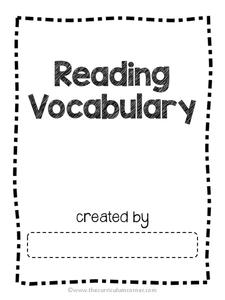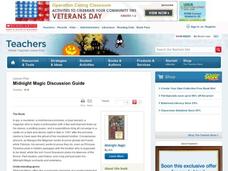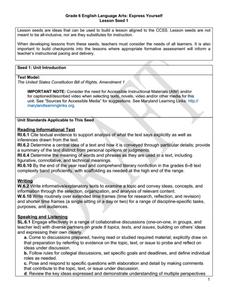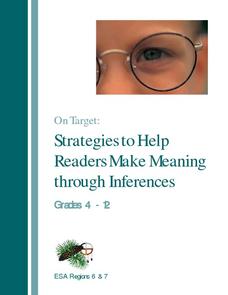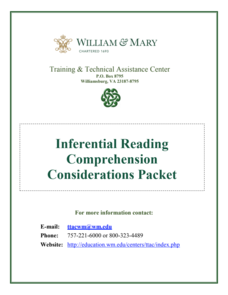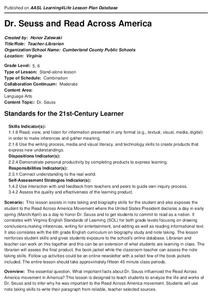Curriculum Corner
Academic Reading Vocabulary
From A to Z, learners define, draw, and find examples of specific reading focus skills in an alphabetized reading vocabulary packet. Words include dialogue, theme, text structure, genre, paraphrase, and many more.
City College of San Francisco
Making Inferences: Reading Between the Lines
Have you ever read part of a story and had to figure out what the rest was about? Practice making inferences with several short passages and multiple choice questions.
Curated OER
Developing Reading Comprehension
Developing reading comprehension is an ongoing process that begins the moment a child becomes engaged with literature. From learning the skills to navigate a picture book to reading an assigned chapter in a chemistry text, good readers...
Teacher Web
Inferring Character Traits
Learning how to draw inferences from text is a key reading comprehension skill. Here's a worksheet that gives readers a chance to practice by offering 20 descriptive sentences and asking kids to identify the inferred character trait, and...
Curated OER
Mini-Lesson Planning for Inferences
Making inferences and drawing conclusions is a key component to successful active reading. Encourage your class to use context clues and prior knowledge to infer different elements of a story, including the setting, plot, and character...
Reading Worksheets
Inferences Worksheet 7
Hone your learners' inference-making skills with this exercise. The worksheet includes four passages that learners read and answer questions about. Pupils must note down their inferences along with textual evidence that support their...
K12 Reader
Inference Practice 2: Where Am I?
Practice using context clues with a learning exercise about making inferences. Five prompts encourage kids to interpret where each event takes place based on the details in each passage.
K12 Reader
What Do You See? (Inferences)
Making inferences is a skill that goes beyond the comprehension of written text. In this simple exercise, young learners are provided with a photograph and asked to answer a series of inference questions using only on the information...
Pearson
Making Inferences
The ability to make inferences is an important skill. Provide your class with some practice. This resource includes several different passages with which learners are required to practice inferring. They read each passage and respond to...
Bethel School District
Observations and Inference
What's the difference between qualitative and quantitative observations? Learners make observations, inferences, and predictions about their environment with a set of questions and activities that are applicable to either language arts...
Curated OER
Inferences Using Evidence
What is an inference, and how can you use textual evidence to create one? Introduce your developing readers to the world of inferencing with this presentation. Terms are defined, and several examples are shown. The class works together...
K12 Reader
What Happens Next?
While your students may not be psychics, that doesn't mean they can't predict what will happen next in a story. To hone this important reading comprehension skill, young learners read a series of three short passages before writing a...
Reading Worksheets
Inferences Worksheet 1
Knowing how to make inferences is a very important skill for readers of all ages. Help your pupils master this ability by providing practice. Pupils read four short passages and answer two to three questions about each to practice making...
K12 Reader
Inference Practice: Where Am I?
Have your pupils try a hand at making inferences. The worksheet includes five different descriptions, and learners must infer where they think the passage is happening and provide some explanation. A straightforward resource for...
Curated OER
Using Poetry in Teaching Reading to Special Education Students
A series of well-written activities, these lessons prompt middle schoolers reading below grade level (at a second, third, or fourth grade level) to use poetry to practice basic reading skills. They rhyme, build words, make inferences,...
Curated OER
Spinelli's Maniac Magee (excerpt): Reading and Critical Thinking Practice
A brief, dialogue-rich passage from Jerry Spinelli's novel Maniac Magee is accompanied by a well-written literacy assessment tool. Thematic content lends itself to age-appropriate discussions about race relations and social justice....
Scholastic
Midnight Magic Discussion Guide
This discussion guide accompanies the fiction book Midnight Magic written by Avi, enforces story elements, inferences, and theme/plot. Have the class work on it over time, it will engage even your reluctant readers.
Mr. Nussbaum
Abraham Lincoln Reading Comprehension—The Presidential Years (Part 4)
How do you bring a nation back together after there is civil war? Readers learn how the United States Civil War concluded with a passage focused on the latter part of Abraham Lincoln's presidency. Multiple choice questions check pupils'...
West Corporation
Making Inferences – Use Your Mind to Read!
How can you tell if someone is happy? The lesson works with elementary and middle school scholars to activate their schema and pay attention to details to make inferences in their daily lives, poetry, and other literature. Cleverly...
Curated OER
Express Yourself Lesson Seed 1
Make a study of the First Amendment and its relationship to freedom. Pupils rewrite the amendment and discuss the central idea before focusing on a specific phrase. After discussing, class members write a journal entry about the included...
Curated OER
On Target: Strategies to Help Readers Make Meaning through Inferences
Here's a resource that explicitly teaches, models, and provides readers with opportunities to practice the process of drawing inferences from text. Packed with strategies elementary, middle, and high school teachers can use, the resource...
K20 LEARN
OPTIC - A Reading Strategy Recipe: Visual Literacy
A visual literary lesson plan provides learners with OPTIC (Observations, Predictions, Themes, Inferences, Conclusions), a reading strategy to help them understand and interpret visual and written texts. Scholars practice the strategy...
William & Mary
Inferential Reading Comprehension Considerations Packet
Don't forget to read between the lines! Educators learn tips and activities to help scholars learn to infer to increase reading comprehension. Activities suggested include think alouds, backwards words, and who's who. the packet includes...
Curated OER
Dr. Seuss and Read Across America
What important facts about Dr. Seuss influenced the Read Across America movement...? This is the driving question of a research project that requires scholars to find information about Dr. Seuss' life and work. Class members write a...


